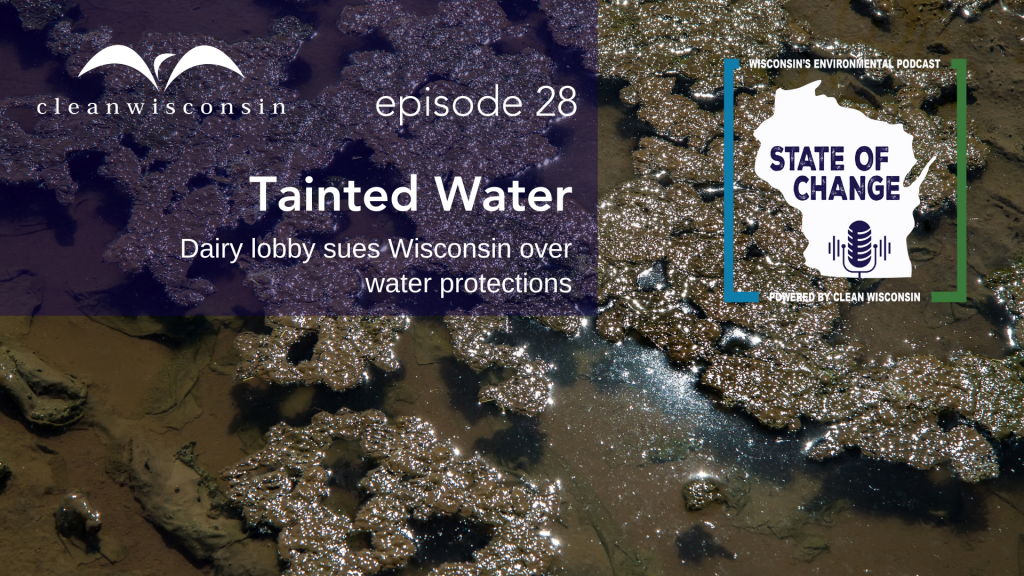Beach closures, fish kills, green lakes. They are unfortunate signs of summer in Wisconsin. A big reason: untreated animal waste. Large dairies can produce as much waste as a small city. It’s not only hard to deal with, it’s dangerous if it gets into our water. Animal manure is one of the biggest sources of water pollution in Wisconsin.
Now, some of Wisconsin’s largest dairies are suing the state, trying to limit oversight of the way they handle animal waste. Wisconsin Manufacturers and Commerce quietly filed the lawsuit just before Memorial Day weekend on behalf of the Wisconsin Dairy Alliance, a lobbying group representing a number of large concentrated animal feeding operations (CAFOs).
In this episode, Amy talks with Clean Wisconsin water and agriculture program director Sara Walling and attorney Evan Feinauer to find out what the lawsuit means for Wisconsin’s water resources and public health.
Host:
Amy Barrilleaux
Guests:
Sara Walling, Clean Wisconsin Water & Agriculture Program Director
Evan Feinauer, Clean Wisconsin Attorney
Background Reading:
Dangerous lawsuit puts water protections at risk
Clean Wisconsin wins pair of landmark state Supreme Court cases
Where to Listen:
Full Transcript:
Amy Barrilleaux: It probably goes without saying. Nobody wants to drink water contaminated with animal waste. Nobody wants to swim in it. Nobody wants to fish in it. But for very large animal operations, it is a challenge to handle the millions of gallons of manure they produce and keep it out of our waterways. That’s why the Department of Natural Resources has a permitting program for those farms to help keep tabs on all that waste. Now, that program is coming under fire.
Joining me are clean Wisconsin attorney Evan Feinauer and Water and Ag program director Sarah Walling. Thank you both so much for sitting down with me to talk about this.
Evan, I’ll start with a question for you. Wisconsin Manufacturers and Commerce has filed a lawsuit against the state on behalf of the Wisconsin Dairy Alliance, an interest group. Why is this lawsuit such a big deal? What’s at stake here?
Evan Feinauer: So the Clean Water Act requires anybody that’s going to pollute to have a permit. And the permit is the vehicle then for all the standards and the requirements and the limits and all the good stuff that these folks have to do to reduce the amount of pollution that they’re putting out. And CAFO’s, these these large livestock facilities, have been classified as as the kinds of entities that need to get permits for a very long time. And what environmentalists and some of these farms have been haggling over for years is, okay, then what standards go into permits? You know, what does a farm have to do to get one of these permits? What are they going to show they’re doing to reduce the amount of water pollution from all the manure they create and spread and store and all of that? What this lawsuit would do is basically wipe away a lot of that good work and efforts to improve the permitting system by saying that some of these farms don’t even need to get permits at all. And the reason is based on this very legalistic argument about what kinds of discharges generate the need to get a permit in the first place. And so the reason this lawsuit is so dangerous is because it would make it hard for the department to really use its major tool to get these large farms to manage their manure in responsible ways and in ways that, frankly, we’ve been for decades trying to improve and strengthen, while also allowing farms the ability to continue to operate profitably. So it’s really kind of a strike at this foundational thing that’s been really important in Wisconsin and other places to reduce the impact of flows on water pollution. So it’s scary to think that that could be going away for some of these farms.
Amy: Okay, let’s back up a little bit. So you have these, you know, we call them farms, but they’re not what we would really picture as a farm. These are big facilities with a whole lot of animals. It could be pigs, could be cows, could be any kind of animal. Why would we be concerned about the way they manage all the animal waste there?
Sara Walling: Really, it’s just the volumes of the manure that’s produced by these largest farms. So you’re just talking about very large number of animals at a given facility in a really concentrated area where all of their manure is being collected and stored in these huge volumes that really mirror a lot of the same waste streams that are being generated by a ton of other manufacturing and industrial processes and companies. And so we’re asking these farms to be permitted in the exact same way that we’re asking and needing all of our industrial wastewater discharges to to be permitted and to have some oversight relative to the waste that they’re generating. So in my mind, it really comes down to volumes. I mean, it’s just it’s a huge amount of manure held in a very small space. It’s being produced in such enormous quantities that it’s a lot harder to manage. It’s a lot harder to keep track of. It’s a lot harder to make sure that it’s being applied correctly and at the right time to really reduce that risk of impacts to our water resources.
Amy: Is it fair to say that pollution from animal waste is a big issue in terms of water quality? Is that pollution making its way into our water right now?
Sara: Agriculture is a leaky system. There’s just really no other way around it. I mean, the plants take up the nutrients at certain times of the year, and they don’t at other times of the year. And our weather patterns are such that it creates a really risky situation when you’re using manure as a nutrient application for crops. Now, it’s important. It’s a huge and beneficial fertilizer source and hugely necessary as a result. However, you know, the fact of the matter is, is that there are some portions of manure being lost through that application process. And so absolutely. And manure storage systems are designed, you know, the earthen lined ones are designed to have some level of leakage associated with them as well. And it’s just something we’ve had to deal with, certainly, and accept to a degree. But that’s, again, a whole underpinning of what the WPDES permit program is doing, is it’s establishing the standards for how that manure is being collected, stored, utilized and handled. And so it’s really important to provide some level of oversight to these largest farms that are just creating such a large amount of manure and a waste stream that needs a lot more oversight.
Amy: Now, initially, Wisconsin Manufacturers and Commerce and the very, very large CAFOs that they represent didn’t really say anything about this lawsuit, but they’ve come out now saying, you know, this isn’t as big of a deal as environmental groups like Clean Wisconsin are making it out to be. What is your response to that? Is it a big deal for these big operations to kind of sidestep this permitting process?
Evan: Well, of course, it’s a big deal. If it wasn’t a big deal, they wouldn’t have filed the lawsuit. I think the biggest thing to keep in mind is that the question of when in which farms need to get permits is sort of this threshold question, because if you’re not in the permitting system at all, then the standards don’t apply to you because you don’t have a permit that you have to comply with. And so the question of who has to get a permit and when is a really big question. And that’s the key thing in this lawsuit, is that they’re saying that it would be the department’s job to go to each of these farms and observe an actual discharge before they can be required to get a permit. And the reason that, again, I referred to this as” legalistic” earlier, the reason that that’s a sort of silly argument for us to have to think about confronting here is that, you know, as Sara mentioned, this is a leaky system. Farms discharge all over the place. These CAFOS, their manure lagoons leak. When they spread manure on fields, some amount of it is going to end up in higher ground in surface waters. So the idea that these farms are operating in this way, that not a drop of water pollution is being created is a it’s an on-paper fiction that they’re attempting to utilize to get out from having to follow the standards and rules of the Clean Water Act. So they can try with a straight face to say it’s not a big deal. But that’s based on something that they that they know themselves that isn’t true.
Sara: I would also add that it benefits all of us as citizens of the state to have a program that’s trying to reduce the potential risk of those impacts happening ahead of time. A discharge would be anything from a manure tanker spilling over, you know, tipping over on the side of a road, to a drag hose that supplies manure to a field breaching, to a manure storage lagoon itself overtopping–and that manure discharging outside of the production area of a farm.
Amy: How common are situations like that? Are there families right now in Wisconsin living near some of these gigantic animal facilities that have experienced this sort of animal waste runoff in their waterways and in their water wells?
Sara: Absolutely. I mean, the crux of the last rulemaking that the DNR was able to do up in the karst area of Kewaunee County in the Northeast was really based on the issues that were happening because manure was making its way into the groundwater system, and the public and private well, owners were seeing brown water coming up through their taps. Again, I think it’s really in our best interest to put safeguards in place where we can to limit the potential of those kinds of pollution events happening in the first place.
Evan: I mean, if you spread manure too close to a sinkhole under dry conditions and you have runoff because the manure, you know, you have liquid manure near a sinkhole or something, then it’s not covered by the exemption under the Clean Water Act. That’s a discharge.
Sara: Right
Evan: And that kind of thing happens all the time. And nobody is there at the moment to record it or capture it. So there are discharges. All of these farms are discharging all the time. They’re just unobserved because observing them would require DNR people to be standing in every field that’s ever spread it. And so those kinds of discharges are the reason that since at least 2017, the DNR has said all of these large CAFOS are required to get a permit, because if you’re operating at this scale with the manure lagoons this big spreading this amount of manure in fields, you’re discharging. And what the permit does is just manage that discharge. And so that’s why I was saying earlier that this idea that we’re going to wait for farms to discharge is fictitious. That’s an ongoing problem. It’s a leak. A leak is a type of discharge, even if it isn’t a big catastrophic spill. Those, of course, are important discharges. And we also know sometimes that those big spills go unreported. So even if it is a hose or something that breaks and there’s hundreds of thousands of gallons of manure going on, we’ve seen just in the last few years, CAFOs just not report that until anonymous citizens bring it to our attention. So we got both these chronic small discharges that are occurring all the time with these CAFOs and these bigger, more acute problems that emerge all of a sudden. And often it’s an emergency. And both kinds of those things are the reasons they need permits, because these permits don’t just manage the chronic leakiness by telling them you can’t spread manure, you know, too close to a sinkhole or not during these times of years. They also say things like, hey, if you got a hose that’s broken, you got 24 hours to get on the phone and call DNR. And if you don’t, that itself is illegal. So we’ve had farmers get fined for that because they just haven’t reported it. And so those are those are two very different kinds of water pollution. But the thing the nice thing about the permits is it can help us deal with both of them.
Amy: So we talk about animal waste. I mean, we all know that it’s used a lot to fertilize crops. It has a good side. But what happens–what is the problem with it getting into drinking water when people consume some of the products of this animal waste?
Sara: Well, animal manure is very similar, obviously, to human waste in that it brings pathogens along with it. So E.coli tends to be one of the bigger ones that we talk about. But certainly people and animals are able to get very, very sick from consuming water that has high levels of animal manure contamination in it. And that was the case that we were seeing certainly up in the northeast, you know, and continue to with the geography there in surface waters. It’s a little different in that the animal manure going into that certainly can still have health and public health and animal impacts. However, the problem really is that it ends up bringing and causing dead zones within areas. So fish kills and whatnot, because it really drops the oxygen levels within the streams to a point that fish and other, you know, inhabitants of the the streams and rivers really can’t live within that. So we end up having a lot of fish kills as a really impactful immediate results. You also see a lot of things like beach closures, neighboring, you know, area lakes and other beaches, Lake Michigan included, as a result of some of the animal waste entering those water systems.
Amy: So when you hear things like, well, you know, this is being blown out of proportion, this isn’t a very big deal., this is just letting businesses do business. What’s your reaction to that?
Sara: I’d say that’s easy to save when you aren’t living in a community that has some of these, you know, really, really large animal facilities. And then, I think, you know, whether they’re doing a good job of managing their systems or not, I think there is a huge benefit to the public through the permitting process as well, because it provides a really great deal of transparency to the neighbors of these facilities to understand what’s happening at the farms, how they’re managing them, and really, what they’re doing there to help give peace of mind, certainly to some of the neighbors who feel it can understand and appreciate what the permit does by providing some of those safeguards for them. But similarly, I think, there’s a need to know and there’s I think there’s a benefit to people, especially nearby neighbors, really understanding what’s happening in their communities. And there’s similar transparency processes associated with permitting that you would have to have for large industrial facilities going into a place or expanding in a certain location that provides that too. And so the WPDES permit process we have in the state provides that same level of transparency around where these largest farms are operating and expanding.
Amy: So two years ago, Clean Wisconsin won a major case at the state Supreme Court that centered around these permits. The win gave the DNR more ability, more tools to use in these permits to try to keep animal waste from getting into our water. At the time, that was a huge victory. But is anything, I guess, ever really a victory when it feels like every time you turn around there’s another lawsuit, another challenge to environmental protections?
Evan: Well, yeah, I mean, I’m I’m confident I’ll be gainfully employed here at Clean Wisconsin doing this work for a long time because we’re never going to kind of get to the point where everything’s squared away. What that lawsuit did was it reinforced the department’s authority to use all of its tools in the permitting process to guarantee that water quality requirements are met, basically, and that includes ground groundwater and surface waters. And in particular, at that time, we wanted farms to do some monitoring. We wanted the DNR to have some tools around saying you can expand this much, but not that much given your storage abilities, given how much land you have available for spreading manure safely, which we thought were pretty common sense and straightforward things that DNR could use in individual permits to respond to water pollution problems. But that’s a good example of what I’m talking about, where what we should be arguing about is what’s reasonable to ask these farms to do in the context of their permits. The question should they have permits to me is so far off the table in any reasonable interpretation of the situation that it doesn’t make me feel like the 2021 Supreme Court victory was, you know, is on shaky ground. It makes me feel like that was even more important to do because I think what it does is it throws in stark relief how important and critical the permitting program is. And I think for that reason would make it really hard for a judge to look at this and see all the facts and all the laws and all the background and agree that now is the time when CAFOs are expanding and there’s more of them, and we have all these acute water pollution challenges in the state, to create this opportunity in the permitting programs for farms just to try to get out from under having to get a permit at all. So to me, it kind of throws into stark relief against the backdrop of of what the judge has said in that case, that this effort by some of these groups, this misguided effort, can’t succeed.
Amy: Now there are some farms or animal operations that are are trying to be good to their neighbors to keep as much waste out of the environment as possible. Is that fair to say?
Sara: Absolutely. I mean, a lot of our largest farms are still considered family owned because it’s brothers and sisters coming together in ownership to be able to have, yes, larger quantities of animals in a given location, but allows one family to actually have a vacation where they don’t have to milk their cows for a week. And so there are a lot of reasons why farms are getting bigger. And I think that the trajectory is going to continue in that in that way. And so I think it also underlines the importance of a permitting process as more and more farms do consolidate and grow larger and larger to have some of these safeguards in place. But now there’s countless examples out there of family farms that have been on that land for generations and generations and really want to do the right thing. And they want their kids to be able to come back in and to be able to farm. And they don’t want to pollute their own water or that of their neighbors and are working very hard. And you’re seeing a lot of that through efforts that are highlighted through the producer-led watershed protection grant program and farms that are really stepping up to demonstrate that they’re doing the right thing and are actually even interested in doing more and being more innovative in these ways. Because as we watch a lot of other industries make progress and how they operate and, you know, innovate on their wastewater issues, manure management really hasn’t changed a ton in the last 50 to 100 years. You collect it, put it together, spread it on a field, and ideally do that at the right time, and the right place and the right amount. But beyond that, you know, we haven’t really moved in a lot of huge ways on a technology to impact and reduce the potential that manure can have on polluting our water and our surface and drinking water.
Amy: So I know it can be hard for people listening to this to figure out what part they can play in this. I mean, I think it’s frustrating if you have a lake that you can’t swim at, if you have water that you’re testing and showing maybe bacteria or maybe even E coli. People are frustrated. What can they do? I mean, now that is a lawsuit you feel kind of helpless. But what can somebody do if they’re hearing this and they want to try to make a difference?
Evan: Well, I would reiterate something you just said, which was, you know, testing your water. I mean, the first thing that everybody has to do is know whether or not they’re affected. So if you live in a rural area and you drink private well water, you should get your water tested for nitrates and or bacteria like E.coli. This is a particular concern if you are pregnant or may become pregnant or you have small kids in the house because of some of the health effects of nitrates, that’s first and foremost. And then, you know, if you want to get involved in the sort of policy of this all. One of the good things about these permits, which would be really sad if it went away for some of these farms, just as Sara was talking, they create these opportunities for the public to be heard in government decisions that affect their health and the health of their families. So every five years when one of these permits runs out and has to be reissued, there should be a hearing, a notice–Hey, there’s gonna be a new permit and there’s going to be hearing where you get to show up and say your, you know, your piece on this. And so if you have concerns about a farm in your area, that that’s your chance to have your voice be heard. It’s not the only chance. You know, you can talk to your state legislator, you can do all kinds of things. But that’s one of the nice things about this permitting process is it says, hey, you’re about to be issued this permit and you need to know how this is affecting me and other people in my community. And so that’s one key way to get engaged, because it may not seem like it, but that can have an impact on what DNR does with some of these permits. If they know that there’s a lot of local concern and sometimes they might not even be aware of contamination issues because again, DNR can’t be everywhere all the time. So bringing information to them and advocating for a result still can have an impact in that permitting process. The other thing is just to try to stay aware of of what a farm is doing and how the permits work and what they require. Because one of the things we’ve seen is that the more people understand about how these farms work, they can be better informed citizens in terms of advocating for change. And that particularly understands how farming works and understands how the manure gets spread, how it ends up in the groundwater, and kind of getting engaged and kind of the science of it all to understand what can be done and therefore having a stronger voice. Then when you want to show up at one of these hearings and say, let’s do something.
Amy: Evan Feinauer, Sarah Walling, my very knowledgeable and awesome colleagues here at Clean, Wisconsin, thank you both so much for taking the time to explain all this.
Sara: Our pleasure.
Evan: Thank you.






